- Home
- Donis Casey
The Wrong Girl Page 10
The Wrong Girl Read online
Page 10
After what Poole had told him about Graham Peyton, Oliver wondered if he really wanted to find out how the bastard had ended up buried under rocks at the foot of a cliff.
He sighed and stood up. “Hal, when you get back to the station, can you find out if anything unusual was going on in the valley around the time that Peyton disappeared? I know he was never reported missing, but my client last saw him alive in 1921.”
“Jeez, Ted. Think you can narrow that date down for me a little?”
“In the fall. September, is what I was told. But if you can just go through the incident reports from that fall and see if anything stands out, I’d appreciate it.”
“The usual arrangement?”
Oliver removed a ten-dollar bill from his wallet and handed it to the policeman. “The usual arrangement. Oh, and let me know if the coroner turns up anything interesting when he looks over the bones.”
Poole pocketed the gratuity. “What are you going to do now?”
“My client’s agent gave me the names of some of Peyton’s known associates, along with the addresses of Peyton’s office and of the place he was living when he disappeared. I figure I’ll drive over to Los Angeles and have a talk with his former landlady, see if she remembers anything helpful.”
~Oliver begins to piece together
the last days of Peyton’s life.~
Peyton’s last known address was in Los Angeles, in the Westlake District, a section of town that Oliver knew pretty well. The district was popular with actors, full of expensive bungalow courts. Peyton may have been a criminal, but he was a prosperous one. His rented bungalow was located on Alvarado Street. Oliver had called the property manager and was gratified to hear that she lived in the same complex, right across the courtyard from Peyton’s former abode. Yes, she remembered Graham Peyton, and yes, she’d be willing to talk to him about her long-gone tenant.
As soon as he pulled up in front of the bungalow court Oliver realized with a jolt that this was the same place where three years earlier the director William Desmond Taylor had been shot to death by persons unknown. The well-kept two-story Spanish style duplexes may have been high-class, but Oliver wouldn’t live in a place with such bad hoodoo on a bet. He parked his Ford on Alvarado and made his way up the sidewalk to the manager’s bungalow at the end of the complex, next to the garages. He rang the bell and was greeted by a pleasantly attractive middle-aged woman with a flat middle western accent who called herself Debbie Hall.
After he introduced himself as a private agent working with the police, she invited him into her neat parlor and offered him a cup of coffee. He politely refused. “How long have you been manager here, Mrs. Hall?”
She sat down opposite him in a wingback chair, happy enough to get down to business. “I’ve been taking care of this complex for a dozen years. My only child is grown and my husband is a lawyer for Sennet Studios. Managing the people who keep the grounds nice and maintaining the units keeps me busy.”
“You know most of the tenants and owners?”
“Oh, yes, certainly. Sometimes I feel like my job is more like being a head doctor or a nursemaid than a property manager.”
“And you remember Graham Peyton?”
“Of course. He lived in 404½, at least when he was in town. He was often gone for weeks on some business trip or another. He always paid his rent six months in advance. He was a nice man, very charming. But I was glad when he was away on business, because when he was here he was trouble. He was always bringing floozies home with him. There were a lot a screaming fights over there. I tried to stay out of it. A number of actors live in this complex and there’s always something loud and obnoxious going on.” She hesitated, and Oliver figured she was considering whether to tell him about Desmond’s murder. Apparently not. “Besides, it was none of my business,” she said, “unless somebody complained. Then I’d have go over there and threaten to call the cops. That usually took care of it.”
“Do you remember any floozy in particular? Any names?”
“Like I said, I mind my own business. They all looked alike to me. Young. Too much makeup, not enough clothes.”
“Was there anyone who visited Peyton on a regular basis? Besides the floozies, of course.”
Mrs. Hall took a moment to consider. “Not that I remember.”
“How long was it before you knew he was gone for good? That he wasn’t coming back?”
“Well, last I saw him was a couple of months before his rent was due. I didn’t think anything of it when I didn’t see him again after that, not until his next rent payment was overdue. It wasn’t unusual for him to just go away with no warning.”
“When was that?”
“Like I said, four, five years ago. It was in the fall, I think, last time I saw him. After he skipped his rent, I went around there a few times before I got the picture. I gave him longer to show up than I would most of my tenants. He had always been Johnny-on-the-spot with his rent. Always paid in cash.”
“Did you know how he made his living, Mrs. Hall?”
He was angling for dirt, but Mrs. Hall didn’t pick up on it. “I always make sure my tenants have a source of income before I rent to them. He had a nice letter of recommendation from a bank. He told me he worked for the studios, usually Warner or Sennet. He said he was a supplier. He was always dressed nice.”
“What did he supply?”
Mrs. Hall shrugged.
Oliver leaned back into the couch. “Did you report his disappearance?”
“No. People skip out on me all the time. The cops would be tired of seeing my face if I reported it every time a tenant left me in the lurch.”
“How’d Peyton leave his place? Did you notice anything odd when you cleaned it out?”
The question amused the landlady. “You mean like a closet full of gats or a body under the bed? Nothing odd that I remember.”
“What did you do with his stuff?”
“What do you think? I sold most of it.”
“Did you find any cash?”
“Yes, he had a small cashbox with about a hundred bucks in it. I confiscated it. He owed me for the two months I let him slide, plus the cleaning deposit.”
“How about a ledger? Red leather, about yea-by-yea big, containing a lists of names and numbers?”
“Not that I remember. No books at all, as I recall.”
“Do you have anything of his left? A box, a suitcase?”
“I don’t know. I might. It would be more in the line of a nice dish or a pillow. Something I could use. Why are the police suddenly interested in Graham Peyton after all this time?”
Well, it took you a while to wonder about that, Oliver thought. “Some people walking on the beach up in Santa Monica found a body at the foot of the bluffs. It has been there for a while. The police believe it’s Peyton.”
“Is that so?” Mrs. Hall did not seem shocked by her erstwhile tenant’s purported demise. “Well, I’m sorry to hear that. So you’re trying to find out what happened to him?”
“I’d like to, yes.”
The landlady hesitated, then said, “There was one odd thing that happened after the last time I saw Mr. Peyton. I didn’t know at the time that he was gone for good. A woman came looking for him. Not his usual female visitor, not by a long shot. There were two men with her. One seemed like her driver, or her bodyguard. He was a big guy in a uniform, anyway. The other man was older, dressed like an accountant. She told me she was Peyton’s mother. She paid me a nifty little bit to let her into his bungalow. She said she wanted to leave him a note to let him know she was in town and he should get in touch with her. I kept an eye on her auto—it was a limo, really—from my kitchen window while she was in there. She and the accountant stayed inside the bungalow for quite a while, maybe an hour. Finally she left and I never saw her again. I meant to mention it to Graham when he got
back from his trip, but he never did and I forgot about her until now.”
Oliver sat up straight. “She said she was his mother? She was an older woman?”
“That’s right.”
“What did she look like?”
“You wouldn’t look twice at her. Old-fashioned. She looked sort of like Queen Victoria. Short, white-haired, dressed in black. Little bit of an accent. I don’t know what kind.”
“The bungalow that he lived in, I guess you rented it out after Peyton disappeared.”
“Of course. There have been three different tenants in that unit in the past five years. There won’t be a trace of Graham Peyton left after all this time.”
“Say, do you remember what kind of automobile Peyton drove?”
“That, I do remember. He liked a fancy ride, like he was a titan of industry, or wanted people to think so. Had a big old seven-seater Pierce-Arrow touring car.”
* * *
Oliver returned to his walk-up on Santa Monica Boulevard and took a chair at the enamel kitchen table in order to review his notes.
Peyton’s bungalow had been cleaned out years ago, and whatever possessions he had left behind had been scattered to the winds. If the landlady had helped herself to fifty thousand dollars, why wasn’t she wearing mink and living in a mansion in the Hollywood Hills? Besides, Oliver figured that Peyton hadn’t been stupid enough to keep that kind of money in a drawer under his socks.
And who was this old woman who claimed to be Peyton’s mother? Oliver had assumed that Peyton had no family. This was an unexpected twist, one that could be worth pursuing.
Since Peyton had told Mrs. Hall that he worked for the Warner brothers, Oliver telephoned his secretary friend at Warner Studios to see what she could find out. Peyton had spread the word that he was a big cheese producer on Broadway, so Oliver rang up Poole and offered him a persuasive inducement to contact the New York City PD and find out if Peyton had had any dealings with the law there.
Oliver spent the rest of the afternoon telephoning banks in the Los Angeles area and asking if Peyton had ever had an account with any of them. He had come up empty. He made a note to see if Poole could help him there, as well.
Speak of the devil, they say, and up he pops. Oliver’s telephone rang, and when he answered, Poole said, “Hey, Ted, I’ve been checking the crime reports from 1920 and ’21, and I came across this. It’s a report of an abandoned automobile up in Palisades Park, dated October 15, 1921. A Pierce-Arrow touring car. It was parked way at the end of the park, and there’s no telling how long it sat there before one of the park employees had it towed. There wasn’t any license plate or any papers in the car, and it doesn’t look like anybody went to a lot of trouble to trace the owner.”
“A Pierce-Arrow. His landlady said he drove a Pierce-Arrow. An expensive auto like that doesn’t get abandoned for no reason. Could it be that Peyton got bumped off and his killer tossed him over the cliff, then cleared everything out of the car so it couldn’t be traced?”
“It says here that nobody ever came to claim the car, so after a few months the city auctioned it off.”
“Does it say who bought it?”
Poole laughed. “Yeah. The L.A. city attorney. Doesn’t say how much he paid for it, but I’m guessing he got it for a song.”
“Thanks, Hal. Heard anything from New York yet?”
“Naw, not yet. They don’t feel the need to roust themselves for the likes of us yokels on the West Coast.”
“By the way, do you have any information on Peyton’s family? Anybody to notify about the death?”
“No family that I know of. We’ve checked for next of kin and haven’t found any. We’ll probably put a notice in the local papers.”
“The landlady said that his mother came by looking for him shortly after he disappeared.”
“His mother? Well, everybody has a mother, I guess. I’ll let the chief know and we’ll try to track her down. This woman may have been spinning the landlady a tale. That happens, you know. Maybe Peyton owed her money, or seduced her daughter.”
“I’m inclined to believe the latter. I doubt Peyton actually had a mother. Keep me posted, and if I turn anything up I’ll let you know.” Oliver replaced the earpiece on the hook, removed from his file the photo of Graham Peyton that Mr. Ruhl had supplied him and slipped it into his inside jacket pocket. It was time to apply some shoe leather to the streets of Hollywood, where Peyton’s office had been located.
1920, Slaughterhouse Gulch, Arizona
“Damn, Zelko, do we have to shoot this scene right now? The light is about to go and my ass feels like it’s been kicked by a cast of thousands.”
“Miss Bolding, if you’d pull your knees in when you ride you wouldn’t bounce around in the saddle so much.”
If Alma hadn’t been so tired, she would have been irritated by the unsolicited advice. Especially since it was coming from an idiot stray little girl who had just brought her lunch. As it was, she was amused and a bit grateful to be distracted from her aching derriere. She lifted an eyebrow at the impertinent creature standing near the horse’s head, holding the reins. “So now you’re an expert on riding as well as chicken frying, are you? Well, I’ll have you know, missy, that this horse is the devil incarnate and absolutely refuses to do what he’s told. In fact, I’m going to insist that Tom dock his wages.”
“There’s nothing wrong with this horse, Miss Bolding. He just knows that you don’t know what you’re doing. You’ve got to show him that you’re the boss.”
Alma’s eyebrows shot toward her hairline and she loosed a shriek of laughter. “If this horse doesn’t know enough to show me the proper deference, then he hasn’t been reading Photoplay lately. I’m a big star! I’ll tell you what, sassy young lady, if you think you can do better, then I invite you to demonstrate.” Alma made an impatient gesture at Zelko, the cameraman, who rushed over to help the groaning actress out of the saddle.
Alma half expected Blanche to backtrack quickly and make an excuse, but the girl gave her an eager grin and vaulted up onto the horse’s back after a mere nod at the stirrups. The horse sidled, ears perked forward and eyes wide, recognizing that a serious change in his circumstances had occurred.
“Why, I think you have been on a horse before,” Alma observed.
“I grew up on a horse farm, Miss,” Blanche said, before she pulled the horse’s head around and took off down the gulch at a gallop.
Alma clapped her hands in delight.
“Is that your little kitchen maid?”
Alma hadn’t realized that her leading man, Tom Mix, had come up behind her. “Delphinia found her wandering around the woods by my cabin just a few days ago and took her in like a stray puppy. She ran away from home with a criminal lowlife and when she realized her mistake she did a skidoo. Delphinia got her a job peeling potatoes for the crew, but it seems our little puppy possesses hidden talents.”
“Be danged!” Tom pushed his hat back with his thumb. “That gal can ride, can’t she?”
Blanche was acutely aware of their eyes on her as she showed the horse who was boss. Perhaps if she could convince her benefactors of her mettle, one or the other of them might find a task for her on the set, something that didn’t involve potatoes. She turned the horse back toward the watching crowd and when she reached a relative straightaway, she urged him into a gallop before removing one foot from the stirrup, then the other, raising herself up to crouch on the saddle, knees bent, one hand holding the reins and one straight out for balance, her hair streaming in the wind. She had only tried this trick once before, on a dare from one of her brothers, but she had pulled it off then and saw no reason she wouldn’t be able to pull it off now. Besides, if she fell and broke her neck, at least that would be the end of her troubles.
The actors watched her race down the gully. Alma pouted. “I’m feeling disgruntled, Tom. That c
ontrary beast wouldn’t do anything for me, no matter how nicely I asked.”
Tom barely heard her. “Look at that, Alma!”
Alma cut Tom a narrow glance. Perhaps this was an opportunity to help both the girl and herself. “Listen, Tom, I’m getting another one of my brilliant ideas. What say we offer her the job of stunt double for me? We’re both slim, brunette, and about the same height. She’s enough like me that she could fool the camera from a distance. The fifteen years I’ve got on her shouldn’t make a difference.”
“Fifteen years?” Tom repeated with a twinkle.
“Fifteen goddam years, Tom, and don’t give me any lip.”
Blanche was back in the saddle when she reined in in front of the two stars in a cloud of dust. Alma waved a hand in front of her face and coughed dramatically, but Tom grabbed the stirrup. “What’s your name, honey, and where did you learn to ride like that?”
“I’m Blanche, Mr. Mix. My daddy and my grandpapa both raise mules and saddle horses. I been around horses all my life. There’s not much I don’t know about them.” Her desire to impress the star prevented her from mentioning that she had absorbed all her horsecraft through sheer proximity and had never been interested in learning more than she needed in order to do her assigned chores or get to where she was going.
“Where are you from, Blanche?”
“I grew up in the east part of Oklahoma, sir. Same as you.” Every Oklahoman living, whether he had seen a motion picture or not, was familiar with their homegrown hero, cowboy star Tom Mix.
“I thought you sounded like home,” Mix said, delighted. “I’ll tell you what, Blanche. Miss Bolding here has had an idea I think you might like. How would you like to be Miss Bolding’s double for the riding scenes in this here picture? We’d sign a proper contract for the duration of shooting. I’d pay you five dollars for every day you appear in front of the camera and an extra five dollars for every stunt.”
Blanche blinked down at him. “A double? What’s a double, Mr. Mix?”
“That means that whenever Miss Bolding’s character is supposed to be riding on horseback, it’ll be you on the horse instead of her.”

 The Wrong Girl
The Wrong Girl Valentino Will Die
Valentino Will Die Hell With the Lid Blown Off
Hell With the Lid Blown Off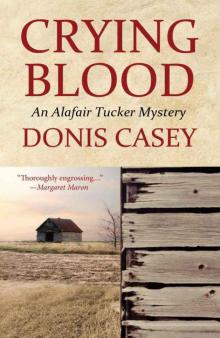 Crying Blood - An Alafair Tucker Mystery
Crying Blood - An Alafair Tucker Mystery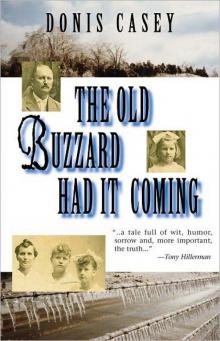 The Old Buzzard Had It Coming: An Alafair Tucker Mystery
The Old Buzzard Had It Coming: An Alafair Tucker Mystery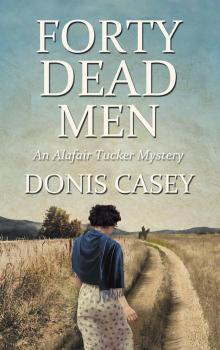 Forty Dead Men
Forty Dead Men All Men Fear Me
All Men Fear Me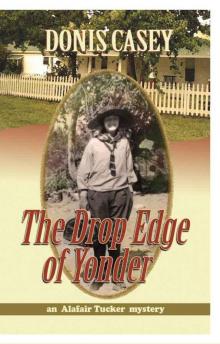 The Drop Edge of Yonder - An Alafair Tucker Mystery
The Drop Edge of Yonder - An Alafair Tucker Mystery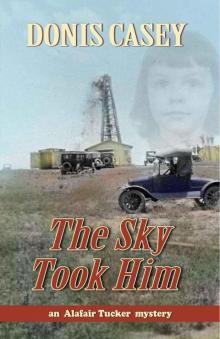 The Sky Took Him - An Alafair Tucker Mystery
The Sky Took Him - An Alafair Tucker Mystery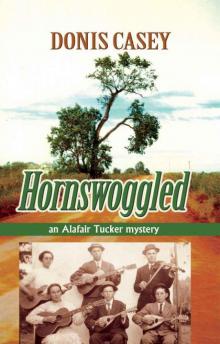 Hornswoggled - An Alafair Tucker Mystery
Hornswoggled - An Alafair Tucker Mystery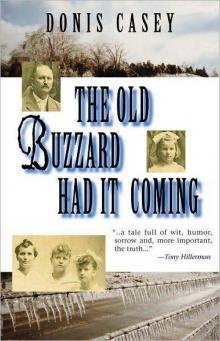 The Old Buzzard Had It Coming
The Old Buzzard Had It Coming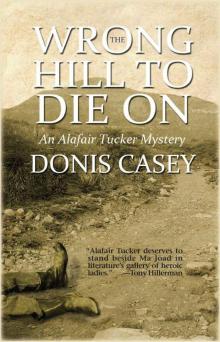 The Wrong Hill to Die On: An Alafair Tucker Mystery #6 (Alafair Tucker Mysteries)
The Wrong Hill to Die On: An Alafair Tucker Mystery #6 (Alafair Tucker Mysteries)